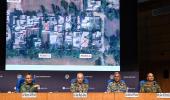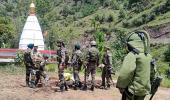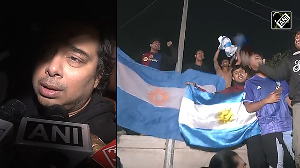'Had Haji Pir and/or Skardu been taken, the message would have gone out not just to General Asim Munir and his cohort in the Pakistan army but to the Pakistani people that every terrorist incident in India would lead to substantial loss of territory in PoK.'

"Sindoor served as a symbolic gesture more than it achieved a substantive aim. What, after all, was the purpose of the minimal military actions we saw unfolding in realtime? It is not at all clear. Will it prove a deterrent for the ISI from mounting terrorist actions in the future in J&K and elsewhere? Of course not," asserts Dr Bharat Karnad, a well-known contrarian voice on national security.
Dr Karnad, emeritus professor in national security studies at the Centre for Policy Research, the New Delhi-based think-tank, is the author of India's Nuclear Policy and Nuclear Weapons and Indian Security: The Realist Foundations of Strategy.
The first of a two-part interview.
President Trump claimed on Monday evening that 'We stopped a nuclear conflict. I think it could have been a bad nuclear war. Millions of people could have been killed.'
Were India and Pakistan, in your assessment, truly on the verge of atomic Armageddon last week?
Or is it typical Trumpian overstatement?
It is the usual Trumpian hyperbole. The nuclear swords were nowhere near being unsheathed as the US president makes out.
It is in his interest, however, to vastly exaggerate his role as 'peacemaker', considering he has been frustrated in Ukraine and Gaza, so Op Sindoor was a godsent for him.
CNN reported that the Trump administration was alerted by intelligence on Friday that compelled the US to get quickly involved in resolving the India-Pakistan crisis after initially shrugging off any involvement.
Apparently, the 'intelligence' was about an Indian airstrike coming perilously close to breaching one of Pakistan's nuclear storage sites.
Could we have done so considering both India and Pakistan have a list of each other's nuclear sites, precisely to avert that dire possibility?
The Indian missile attack on Chaklala -- HQ Strategic Plans Division, Pakistan's nuclear secretariat -- may have been a wakeup call.
But the ops cell of the SPD is situated underground which the Indian missile could not have, and was not, designed to penetrate.
The message sought to be conveyed to Pakistan was the seriousness of India's intent.
Whether it was so accepted is questionable.
But there is no doubt, however, that India's agreeing abruptly to end Sindoor has propped up Pakistan's belief that its threat of nuclear first use worked, that its nuclear deterrence is intact.

If this information to the White House came from the Pakistanis, could it have been classic ISI deception designed to alarm the Americans, get them involved in finding a resolution and get them to persuade the Indians to call a cessation of hostilities especially when Pakistan is in no economic condition to continue a long war?
Sure, it is quite possible the Indian attack on Chaklala (and also allegedly on targets in the Kirana Hills where there might be some nuclear testing facilities) was exploited by Islamabad to get the Americans to step in to stop the proceedings.
But that is not the reason for the American intercession. The fact is the US cannot afford to let Pakistan go under, or to suffer grievous harm because it is at once the most pliable and the most critical ally in Southwestern Asia which it simply cannot do strategically without.
It is this fact of international life Messrs Modi, Jaishankar and the MEA seem not to appreciate with their futile attempts to try and replace Pakistan with India in America's strategic calculus.
Islamabad knows its value, its indispensability, to the US and the West generally and, therefore, keeps pushing the envelope.
In the event, if India ever girds up its loins to militarily wrench important areas of PoK from Pakistan, it will have to do so in the face of active American opposition. Understand that!
Should India have accepted the offer of a ceasefire when its military objectives were incomplete?
No. But then it does not seem the Indian government and the military had any LOC-changing, PoK territory-grabbing, objective in mind for Op Sindoor.
And a golden opportunity to exercise the option of making a lasting impression on the Pakistan army was lost.
More so because Pakistan had opened the doors for Indian actions to grab vital pieces of PoK when Islamabad announced it had 'suspended' the 1972 Simla Accord, which legitimised that ceasefire line -- the LOC as virtual boundary.
The chance was thus missed to rationalise, to straighten, the LoC as I had advocated in my 'Security Wise' Blog of April 30, by capturing the Haji Pir Bulge at one end, and even Skardu at the other end to link up with the Indian control of the Saltoro Muztagh to the Siachin Glacier.
The short point is, a military operation has to impact an adversary's thinking and mindset in the manner desired.
Had Haji Pir and/or Skardu been taken, the message would have gone out not just to General Asim Munir and his cohort in the Pakistan army but to the Pakistani people that every terrorist incident in India would lead to substantial loss of territory in PoK.
This would have proved a powerful motivation for GHQ, Rawalpindi, to give up its use of terrorism as a successful tool of asymmetric warfare against India.

Do you think India had no option but to accept the ceasefire because the government would not want to displease Mr Trump?
Have never understood the tendency of the Indian government, whether under Manmohan Singh and now Narendra Modi, to bend its knees to Washington.
It is, by now, a reflex Indian policy. Think of the leverages India has that the government does not use. Its geostrategic location and resources.
Without India's help and assistance the US policy of containing China in the Indian Ocean with India's position astride it, and in Central Asia with its geographic reach to the north, is null and voided.
And what about the 'access to the Indian market' economic leverage? No economy -- not the Americans, not the Chinese -- can do without selling to India, peddling their wares to Indians.
The government scrupulously avoids using it against the US and China, or in the context of the free trade agreements being negotiated left and right, anyone else.
It is hardly a surprise that India, far from getting respect, has a burgeoning reputation for its timidity.

Or was a ceasefire okay with the government and military because 1. We had achieved militarily more than what we set out to especially during days two and three of the conflict, and 2. Because the nightly drone attacks from Pakistan had scared and unnerved the unprepared-for this population in north Indian cities?
Of course, the Indian people have no experience of war, are easily rattled, and are jingoistic only up to the point nothing happens in a crisis!
If this is a given, surely, the government would have factored this aspect into its calculations before embarking on the punitive drone and missile strike mission.
And what great results have been achieved with these hits on Pakistani targets, pray?
Indeed, if anything, the damage is so easily repairable, the Pakistani government, army and people are already celebrating the ending of the 3-day 'war' as a great win for Pakistan!
If anything, Sindoor has led to elation in Pakistan as to how well its military handled India.
As one of India's premier national security experts, what is your assessment of Operation Sindoor?
Sindoor served as a symbolic gesture more than it achieved a substantive aim.
What, after all, was the purpose of the minimal military actions we saw unfolding in realtime? It is not at all clear.
Will it prove a deterrent for the ISI (Pakistan's Inter-Services Intelligence) from mounting terrorist actions in the future in J&K and elsewhere? Of course not, especially with the restoration, for all intents and purposes, of the status quo ante.
So, what was it all about? Sure, as I suggested in my blog post of May 7, a psychological barrier has been breached with the strikes on the campuses of the Lashkar-e-Tayiba in Muridke and of the Jaish-e-Mohammad in Bahawalpur.
But the effect should not be overstated. Because the Pakistani authorities had vacated both areas of people the day before the Indian missiles struck, suggesting the Pakistan army had intelligence on the incoming Indian attacks.
Still, strikes on Pakistan's Punjabi heartland is a threshold crossed.

By striking a wide number of terrorist targets in the first round on Tuesday night and military airfields in consecutive rounds on Wednesday night/Thursday night, did we inflict enough punishment on the ISI and the Pakistan army for the horrific Pahalgam attack?
No. Sindoor has caused some deaths and material losses, true.
But the destroyed physical facilities can be quickly rebuilt, And youth schooled in extremist-run madrassas provide a steady and unending supply of jihadis and mujahideen.
So net result: Sindoor will make no difference whatsoever to Pakistan's attitude to Kashmir or to use of Islamist terrorism.
What surprised you most about Operation Sindoor?
I was surprised by just how restrained the Indian military effort actually was in contrast to the rhetoric following the Pahalgam massacre on April 22, when Modi talked of 'unimaginable consequences'.
So were any of the Indian strikes during Sindoor unimaginable?
I was astonished, as well, that the government and the military did not prepare for swift and telling actions to oust the Pakistanis, at least, from the Haji Pir Salient that offers the ISI with the main infiltration routes into the Srinagar Valley from south of the Pir Panjal Range.
One would have thought the time lag between Pahalgam and Sindoor would be used to get the forces ready for capturing Haji Pir.
It was captured by 1 Para in the 1965 War only to be returned at the Tashkent talks in exchange for Chhamb that the Indian Army lost. (Except, Chhamb was lost again to the Pakistan army in 1971, this time for good.)
Did any aspect of Operation Sindoor disappoint you?
Absolutely everything except the symbolic hits on Muridke and Bahawalpur, for the reasons detailed above.

Do you believe Marc Rubio's assertion that India agreed to discuss all issues with Pakistan at a neutral venue?
Would External Affairs Minister S Jaishankar and National Security Adviser Ajit Doval, who Rubio interacted with, given the Americans such an assurance?
Has the Trump administration restored the hyphen with Pakistan that vexed India's leaders and diplomats for years?
There's some confusion about what it is the Jaishankar-Ajit Doval duo agreed with the US Secretary of State Marco Rubio on.
Retired diplomats, who may or may not be plugged into the official loop, say that 'neutral site' was accepted on ambiguous terms.
That does not detract from the fact that New Delhi wilted under American pressure.
Whatever the truth, the fact that the Modi regime accepted the US as an intermediary establishes a bad precedent that Pakistan will capitalise on in the future both because it formally defines America as an enforcer against India, and because it re-hyphenates India and Pakistan -- a giveaway which is a manifest diplomatic disaster.
One had hoped that South Asia had left behind the hyphenation phase for good.
Feature Presentation: Aslam Hunani/Rediff.com










